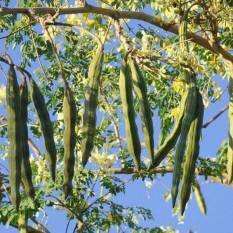CHENNAI, 25 April 2024: In the heart of India’s agricultural landscape, a green revolution is unfolding—one that promises economic prosperity and nutritional security. The Moringa oleifera, commonly known as the drumstick tree, is at the center of this transformation.
With its rapid growth and myriad uses, Moringa farming is offering Indian farmers a sustainable and profitable alternative.
The Benefits of Moringa Farming
Farmers across India are reaping the benefits of Moringa cultivation. The tree’s resilience to drought and low maintenance requirements make it an attractive crop for India’s varied climatic conditions. Its leaves, pods, and flowers are a treasure trove of nutrients, providing a source of income and food security for farmers.
A State-Wise Snapshot
Moringa cultivation is widespread in the southern states of Tamil Nadu, Karnataka, Kerala, and Andhra Pradesh, as well as central regions like Madhya Pradesh and Uttar Pradesh. These areas, with their favorable climate and soil conditions, have become hubs for Moringa production, contributing significantly to the country’s output.
Government Support and Subsidies
The Indian government recognizes the potential of Moringa farming and offers support to farmers. Initiatives like the “Tamil Nadu Organic Farming Mission” encourage organic cultivation practices, providing a cluster-based approach to boost Moringa production. Additionally, agencies like APEDA are aiding farmers in creating infrastructure necessary for Moringa product exports.
The Global Market and India’s Role
The global Moringa market is burgeoning, with a size worth around USD 9.5 billion in 2022, projected to grow to USD 18.2 billion by 20306. India, as the largest producer, meets over 80% of the global demand5. This dominance is a testament to the country’s long-standing tradition of Moringa consumption and cultivation.
Disrupting the Global Market
Indian farmers have the opportunity to disrupt the global Moringa market significantly. By increasing production quality, adopting organic certification, and leveraging online platforms for marketing, Indian Moringa can capture a larger share of the international market. The focus on value-added products, such as Moringa powder and oil, can further enhance profitability and global reach.
Moringa farming in India is not just an agricultural activity; it’s a movement towards a healthier nation and a more robust economy. With government support and a growing global market, Indian farmers are poised to lead the Moringa revolution, ensuring that the ‘Miracle Tree’ lives up to its name both domestically and internationally. As the world turns its eyes to sustainable and nutritious crops, Moringa oleifera stands tall, ready to meet the demands of the future.
Improving Moringa yield is crucial for maximizing the benefits of this crop
Here are some strategies that farmers in India can adopt to enhance their Moringa yields.
Climatic Conditions: Moringa thrives in tropical and subtropical regions with well-distributed rainfall. However, it can also tolerate dry conditions.
Soil Quality: Well-drained, sandy loam soils rich in organic matter are ideal. Adding compost or manure can improve soil fertility and structure.
Spacing and Plant Density: Proper spacing ensures adequate sunlight and air circulation, which are essential for plant health and yield.
Pruning and Harvesting: Regular pruning promotes bushier growth, which can lead to higher yields. Harvesting should be done manually with care to avoid plant damage.
Fertilization: Organic fertilizers can be used to ensure better growth. A solution of mustard powder mixed in porridge water can be poured to the roots to help in growth and flowering.
Pest and Disease Management: Implementing integrated pest management practices and monitoring for common diseases can prevent yield loss.
Irrigation: Although Moringa is drought-resistant, some supplemental irrigation during dry periods can boost yields.
By focusing on these areas, farmers can significantly improve the yield and quality of their Moringa crops, contributing to the agricultural and economic growth of the region.
Moringa oleifera, often hailed as a “miracle tree,” is renowned for its rich nutritional profile and health benefits
Here’s a summary of the key health benefits associated with Moringa.
Skin and Hair: Moringa seed oil can help heal skin wounds and may promote healthier hair.
Edema Treatment: Its anti-inflammatory properties may reduce swelling caused by fluid buildup.
Liver Protection: Moringa might protect the liver against diseases like nonalcoholic fatty liver disease by reducing cholesterol and inflammation.
Cancer Prevention: Compounds in Moringa, such as niazimicin, may suppress the development of cancer cells.
Digestive Health: Moringa can aid in treating stomach disorders, act as a laxative, and may help prevent peptic ulcers.
Antibacterial: It has antibiotic properties that may prevent the growth of various pathogens.
Nutritional Supplement: Moringa leaves are packed with vitamins A, C, B-vitamins, and minerals like calcium, potassium, iron, and magnesium.
Amino Acids: It contains 18 types of amino acids, which are the building blocks of proteins.
Blood Sugar Control: Moringa may help stabilize blood sugar levels, beneficial for people with diabetes.
Eye Health: It has properties that could enhance eyesight and overall eye health.
Immunity Booster: The various nutrients in Moringa can strengthen the immune system.
Heart Health: Its antioxidants may help promote heart health and prevent cardiovascular diseases.
Asthma and Lung Function: Moringa may reduce symptoms of asthma and improve lung function.
Hormonal Balance: It can help in balancing hormones, especially beneficial during menopause.
Bone Health: High calcium and phosphorus content in Moringa supports strong bones and teeth.
These benefits make Moringa a valuable addition to the diet, especially in regions where malnutrition is prevalent. However, it’s important to note that while Moringa is a supplement to a healthy diet, it should not replace medical treatments prescribed by healthcare professionals.
Image credit: nurserylive.com























